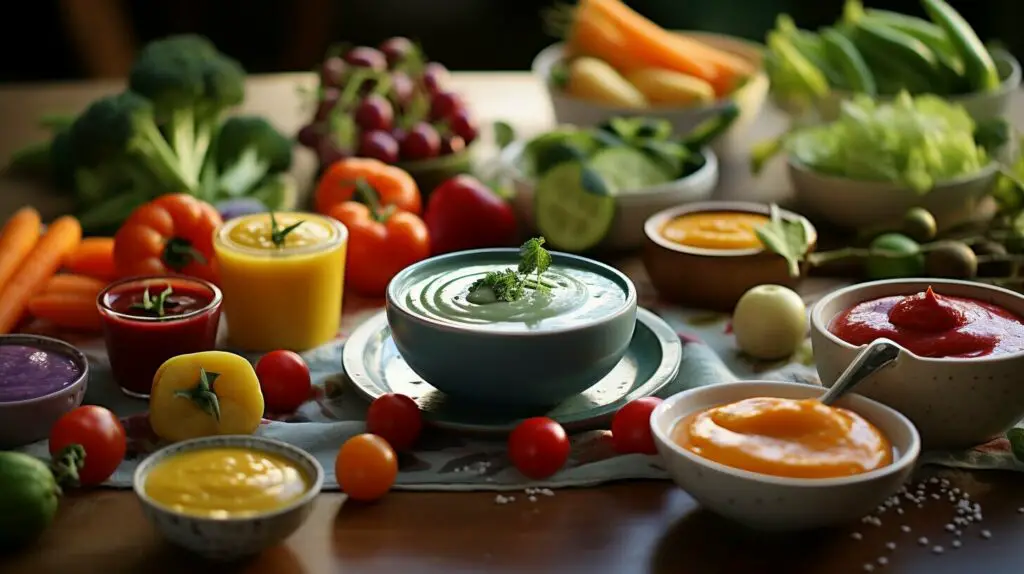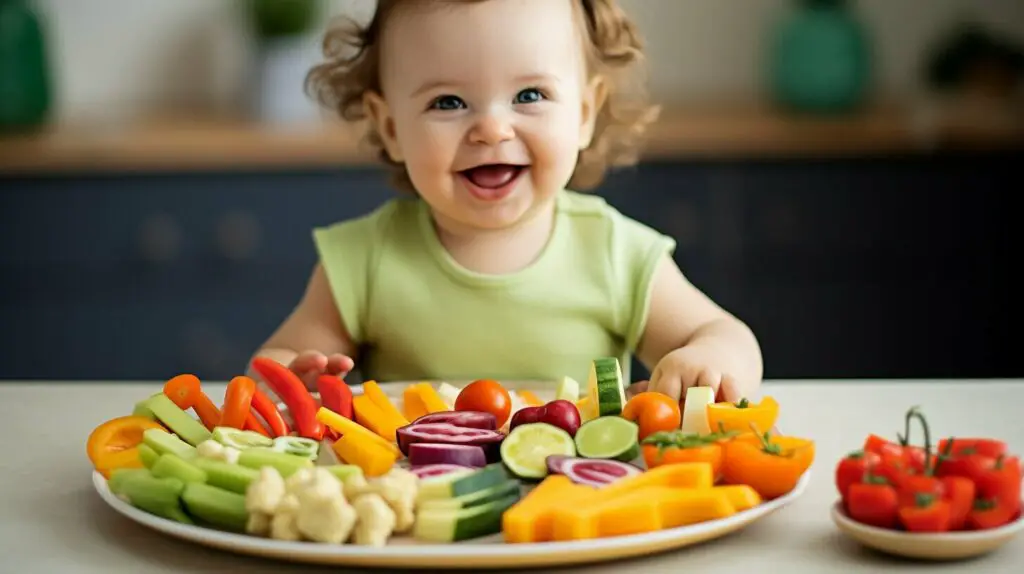When it comes to feeding your little one, you want to make sure they are getting the best possible nutrition and that their food is safe. If you are considering feeding your baby jar food, you may be wondering if you need to heat it up before serving.
While some parents prefer to serve jar food at room temperature, there are some important safety considerations to keep in mind. In this section, we will explore whether or not heating up baby jar food is necessary, and what you need to know to keep your little one safe.
Key Takeaways:
- Heating up baby jar food can enhance food safety and improve taste and texture.
- Feeding your baby jar food at room temperature is an option, but it’s important to follow proper food safety guidelines.
- Always prioritize your baby’s health and well-being when it comes to feeding them jar food.

What is Baby Jar Food?
If you’re a new parent, you might wonder what baby jar food is. In short, it’s a type of store-bought baby food that comes in small, sealed glass or plastic jars. These jars contain pureed or mashed food specifically created for babies and toddlers.
Baby jar food is often referred to as “packaged baby food” or “store-bought baby food.” These terms simply mean that the food is pre-prepared and packaged in jars, as opposed to being homemade.
There are many different types of baby jar food available in stores. You’ll find traditional flavors like applesauce, sweet potatoes, and peas, as well as more unique combinations like mango and quinoa or chicken and rice.
Using store-bought baby food can be a convenient and nutritious option for busy parents. The jars are easy to store and transport, and the food is specially formulated to meet your baby’s nutritional needs.
Is Heating Up Baby Jar Food Necessary?
When it comes to feeding your baby jar food, you might wonder if heating it up is necessary. While some parents may believe that heating up the food is essential, it’s not always the case. In fact, feeding your baby jar food at room temperature is safe in most cases. However, it’s important to consider some factors to ensure that your baby’s health and safety are not compromised.
If you decide to feed your baby jar food at room temperature, make sure to check the label and follow the instructions provided. Some jar foods may require refrigeration, while others can be stored at room temperature. It’s crucial to keep the jar food in a cool, dry place and discard any open or expired jars.
Heating up baby jar food can help enhance food safety by killing any harmful bacteria that may be present. Additionally, heating can make the food more appetizing and easier for your baby to digest. However, overheating can destroy important nutrients and alter the taste and texture of the food.
If you choose to heat up your baby’s jar food, it’s important to do so safely. Never use a microwave to heat up the food, as it can create hot spots that can burn your baby’s mouth or throat. Instead, place the jar in a bowl of warm water or use a bottle warmer to gradually heat the food. Be sure to stir the food well and test the temperature by placing a small drop on your wrist before feeding your baby.
Overall, while heating up baby jar food may enhance food safety and make it more palatable, it’s not always necessary. Feeding your baby jar food at room temperature is safe in most cases, as long as you follow proper food safety guidelines and discard any open or expired jars. However, if you do choose to heat up the food, make sure to do so safely and always test the temperature before feeding your little one.
Benefits of Heating Baby Jar Food
Heating baby jar food has numerous benefits for your little one’s health and well-being. By taking the time to heat up your baby’s food, you are ensuring optimal food safety, improving taste and texture, and promoting healthy digestion. Let’s take a closer look at these benefits below:
| Benefits of Heating Baby Jar Food | Explanation |
|---|---|
| Enhances Food Safety | Heating baby jar food kills any potential bacteria or harmful microorganisms that may be present. This is especially important for infants, who have weaker immune systems and are more vulnerable to infections. |
| Ensures Optimal Baby Health | Heating baby jar food can improve your child’s digestion and absorption of nutrients. The warmth can also soothe your little one’s tummy and make feeding time more enjoyable. |
| Improves Taste and Texture | Some babies may be hesitant to eat jarred food straight from the refrigerator due to its cold, solid texture. By warming it up, you can make the food more appealing and appetizing to your little one. |
It’s important to note that while heating baby jar food has its benefits, it’s not always necessary. In some cases, feeding your baby jar food at room temperature may be perfectly safe and acceptable. However, if you do choose to heat up your baby’s food, you can rest assured that you are providing them with the best possible nutrition and ensuring their safety.
How to Safely Heat Baby Jar Food
When it comes to feeding your baby jar food, it is important to prioritize food safety. This includes properly heating up the food to ensure that it is safe for your little one to consume. Follow these tips to safely heat baby jar food:
- Read the label: Always check the label for instructions on how to heat the food. These instructions may vary between brands and types of food.
- Use a clean container: Transfer the food from the jar to a clean container before heating. This will prevent any contaminants from the jar entering the food during the heating process.
- Avoid using the microwave: While the microwave may be a convenient option, it can heat food unevenly, leaving hot spots that can burn your baby. Additionally, the microwave can damage the nutrients in the food.
- Use a warm water bath: Fill a bowl with warm water and place the container of food inside. Let it sit for a few minutes until the food is heated evenly. Make sure the water does not get inside the container.
- Use a stovetop: Pour the food into a saucepan and heat it over low heat, stirring occasionally. This is a great option if you need to heat up larger quantities of food.
- Check the temperature: Always test the temperature of the food before feeding it to your baby. It should be warm, not hot, to the touch.
Following these safety guidelines will ensure that your baby’s food is heated safely and is free from any harmful contaminants.
Alternatives to Heating Baby Jar Food
While it’s generally recommended that you heat up baby jar food for optimal safety, there are some alternatives to consider if you’re short on time or your baby prefers room temperature food.
Feeding your baby jar food at room temperature is safe as long as you follow some precautions. First, always check the label on the jar to make sure it doesn’t require heating. Second, never feed your baby food that has been left out at room temperature for more than two hours. Finally, if your baby doesn’t finish their food, discard any leftovers as bacteria can quickly develop.
Some benefits of feeding your baby jar food at room temperature include:
- Your baby may prefer the taste and texture of food that hasn’t been heated up.
- You don’t have to wait for the food to cool down before feeding your baby.
- You can save time by not having to heat up the food.
However, it’s important to note that some babies may prefer warm food, and feeding them at room temperature could lead to them eating less or rejecting the food altogether.
When it comes to infant feeding, safety always comes first. If you decide to feed your baby jar food at room temperature, make sure to follow the precautions mentioned above and monitor your baby’s reactions. If you’re uncertain about what’s best for your baby, consult with your pediatrician for personalized advice.
Tips for Feeding Baby Jar Food
Feeding your baby jar food can be a convenient and healthy way to provide them with a balanced diet. Here are some tips to keep in mind when feeding your little one:
- Start with small portions: It’s important to introduce new flavors, textures, and brands gradually to your baby’s diet. Start with a small portion and gradually increase it based on their reaction.
- Monitor for allergies: Keep an eye on any allergic reactions your baby may have after trying a new food. Symptoms such as rashes, hives, or breathing problems may indicate an allergy.
- Choose age-appropriate foods: Different stages of development require different types of food. It’s important to choose age-appropriate baby jar foods to ensure your baby gets the nutrition they need.
- Try different flavors: Don’t be afraid to try new flavors and combinations of baby jar food. This will keep mealtime interesting and can help your baby develop a more varied palate.
- Consider homemade baby food: If you have the time and resources, making your own baby food can be a great way to ensure freshness and quality. Just be sure to follow proper food safety guidelines.
- Make mealtime enjoyable: Feeding your baby can be a great bonding experience. Make mealtime enjoyable by sitting with them, making eye contact, and talking to them in a soothing tone of voice.
- Make sure baby is getting all necessary nutrients: Baby jar food can be a great source of nutrition, but it’s important to make sure your baby is getting all the necessary vitamins and minerals they need. Talk to your pediatrician about any supplements they may recommend.
Following these tips can help ensure that your baby has a happy and healthy feeding experience with jar foods. Remember to monitor your baby’s reactions and always prioritize their health and safety when feeding them.
Conclusion
So, do you have to heat up baby jar food? The answer is no, it is not necessary, but it is recommended for safety reasons. When feeding your little one jar food, prioritize their health and follow proper food safety guidelines.
Heating up baby jar food has many benefits, such as enhancing food safety, ensuring optimal baby health, and improving the taste and texture of the food. However, feeding your baby jar food at room temperature is also a safe option, as long as you take precautions to ensure it is safe for your little one.
Remember to always check the expiration date on the jar before feeding your baby, and to monitor their reactions for any potential allergies. When introducing new flavors, start with small portions and gradually increase as your baby becomes accustomed to the taste.
In conclusion, whether you choose to heat up baby jar food or not, prioritizing your baby’s health and following proper food safety guidelines is the most important thing. So let’s keep our little ones safe and healthy, one jar at a time!




